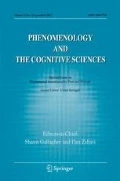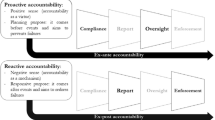Abstract
Harry Collins interprets Hubert Dreyfus’s philosophy of embodiment as a criticism of all possible forms of artificial intelligence. I argue that this characterization is inaccurate and predicated upon a misunderstanding of the relevance of phenomenology for empirical scientific research.
Similar content being viewed by others
Notes
Personal communication from Collins to Selinger on 10/15/2006.
While Dreyfus suggests some causal models that deserve consideration, he does not propose a scientific explanation of why human bodies and minds function as they do though there are exceptions. Thus, occasionally, Dreyfus has tried to interface his phenomenology with scientific explanations of how the human brain functions. See, for example, his discussion of Walter Freeman. Similarly, although he now repudiates it, in Mind Over Machine Dreyfus and his brother Stuart entertained the possibility that the human mind might have a hologram structure. Also, in a recent interview with Harry Kreisler, Dreyfus suggests that it would be useful to correlate his analysis of “incorporeality” with the new empirical research on mirror neurons.
The frame problem is expressed in the following question. If a computer has a representation of a current state of the world, how can it determine which of the represented facts remain constant and which require updating?
In this sense, it comes as no surprise that in recent years, Dreyfus has made some positive (although still cautious) claims about neural nets. The underlying epistemological assumptions that guide the design of neural nets vary radically from the underlying assumptions that guided GOFAI.
References
Clark, A. (1998). Being there: Putting brain, body and world together again. Cambridge: MIT.
Clark, A. (2003). Natural born cyborgs: Minds, technologies, and the future of human intelligence. New York: Oxford University Press.
Collins, H. (1990). Artificial experts: Social knowledge and intelligent machines. Cambridge: MIT.
Collins, H. (1992). Dreyfus, forms of life, and a simple test for machine intelligence. Social Studies of Science, 22, 726–739.
Collins, H. (1996). Embedded or embodied? A review of Hubert Dreyfus’ What computers still do. Artificial Intelligence, 80, 99–117.
Collins, H. (2000). Four kinds of knowledge, maybe three kinds of embodiment, and question of artificial intelligence. In M. Wrathall & J. Malpas (Eds.), Heidegger, coping, and cognitive science: Essays in Hubert L. Dreyfus, vol. 2. Cambridge: MIT.
Collins, H., & Kusch, M. (1999). The shape of actions: What humans and machines can do. Cambridge: MIT.
Dreyfus, H. (1965). Why computers must have bodies in order to be intelligent. Review of Metaphysics, 21, 13–32.
Dreyfus, H. (1992). What computers still can’t do. Massachusetts: MIT.
Dreyfus, H. (1996). Response to my critics. Artificial Intelligence, 80(1–2), 171–191.
Dreyfus, H. (2000). Response to Collins. In M. Wrathall & J. Malpas (Ed.), Heidegger, coping, and cognitive science: Essays in honor of Hubert L. Dreyfus, vol. 2 (pp. 314–349). Cambridge: MIT.
Dreyfus, H. (2001). On the internet. New York: Routledge.
Dreyfus, H. (2006). Interview with Andy Keen on After TV. http://andrewkeen.typepad.com/aftertv/2006/02/hubert_dreyfus.html
Dreyfus, H., & Dreyfus, S. (1986). Mind over machine: The power of human intuition and expertise in the era of the computer. New York: Free Press.
Ellis, R. (2006). Phenomenology-friendly neuroscience: The return to Merleau–Ponty as psychologist. Human Studies, 29(1), 33–55.
Gallagher, S. (2005). How the body shapes the mind. New York: Oxford University Press.
Ihde, D. (1986). Experimental phenomenology. New York: SUNY.
Noë, A. (2006). Action in perception. Cambridge: MIT.
Selinger, E. (2003). The necessity of embodiment: The Dreyfus–Collins debate. Philosophy Today, 47(3), 266–279.
Selinger, E., & Crease, R. (2002). Dreyfus on expertise: The limits of phenomenological analysis. Continental Philosophy Review, 35, 245–279.
Selinger, E., & Mix, J. (2004). On interactional expertise: Pragmatic and ontological considerations. Phenomenology and the Cognitive Sciences, 3(2), 145–163.
Author information
Authors and Affiliations
Corresponding author
Rights and permissions
About this article
Cite this article
Selinger, E. Collins’s incorrect depiction of Dreyfus’s critique of artificial intelligence. Phenom Cogn Sci 7, 301–308 (2008). https://doi.org/10.1007/s11097-006-9039-6
Published:
Issue Date:
DOI: https://doi.org/10.1007/s11097-006-9039-6



